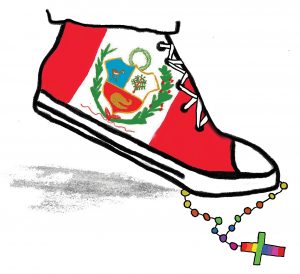When Ernesto Saldivar’s students began to pester him last fall about taking a class trip out of the country, he didn’t want to take them just anywhere.
As a Latin American literature teacher at Jones College Prep High School, Saldivar wanted his trip to impact his students’ education.
“I didn’t want to take them anywhere they might go on spring break,” he said.
So when he learned about educational trips to the United States and Mexico border, Saldivar knew he had found something that could work for his class.
During spring break, students will travel by plane to Arizona where they will spend four days in Nogales, Ariz., and four days in Nogales, Mexico.
To Saldivar, Nogales is the perfect place for his class to see first-hand how American policy has dictated the conditions of people who live on the border. Until 2001, Nogales was a city undivided.
“People would come together to celebrate,” he said. “They used to throw festivals until the wall was built. Now it is one city divided by a 10-foot wall.”
The 15 students and three chaperones will be the first group from a public high school from a large urban area to take a trip like this, Saldivar said. The trip was planned through BorderLinks, a non-profit organization that focuses on building cross-border relationships. BorderLinks educational director Margi Ault-Duell said the organization usually works with faith-based groups and college groups.

This trip will be especially meaningful for some of the students. Since more than half of the students on the trip are Latino, Saldivar said he believes the experience will be “so real” for many. Latinos are the largest ethnic group at Jones Prep, making up about 60 percent of the school’s student body, and a number of them are first-generation.
First-generation American Juan Ascencio said he wants to visit the border to try and understand what his father went through when he came to the states.
“Knowing what he went through to be here—his struggle for a better life for him and his family,” he said.
Juan said it matters what he and his classmates will learn from this trip. It is important for him to empathize with the families involved in the migration process.
Although students were enthusiastic about the trip, Saldivar said he worried about the reaction from parents.
He held an informational meeting in October with a representative from BorderLinks via videoconference and a former Jones Prep student, who recently traveled with the organization, also attended.
Since then, the biggest worry has been making sure students get their passports in time.
The Jones Local School Council unanimously approved the trip at its Jan. 14 meeting.
“Students will bring in their passport before they receive final approval for the trip,” Jones Prep special education teacher and one of the trip’s chaperones Alexandra Guerrero said.
Passport fees are a part of the trip’s estimated $2,000 price, which includes airfare, room and board.
“By purchasing airfare separately, I am able to save some money,” Saldivar said. “Still, $2,000 is a lot of money.”
There have been small efforts to fundraise, but Saldivar said it has not been a priority.
“Next year I hope to really focus more on raising money for the students,” he said.
Saldivar hopes to do an event similar to Walter Payton High School’s international night, which raises money for all students attending international trips.
“Regardless of the student’s ability to pay upfront or not, all of the students will fundraise together. I don’t want anyone to feel left out [because] they can’t afford the trip,” he said.
Jones Prep Principal Joseph Powers said having sat in on a few of Saldivar’s classes, he’s excited about the trip.
“I bought the book,” Powers said of the trip’s required reading assignment The Devil’s Highway by Luis Alberto Urrea. “I haven’t finished it yet, but I enjoyed the students’ discussion.”
The Devil’s Highway depicts the migration of 26 men from Mexico across the border to the United States. Saldivar’s students found the book especially moving, some of them giving it credit for the primary reason they want to take the trip.
“It’s difficult to realize that [the book] is a real story,” 17-year-old Max McKune said.
Students will see the detention cells used to hold people captured trying to cross the border illegally in Nogales; McKune said the book elicited a “morbid curiosity” in him.
McKune is also interested to see how the Border Police will act, though he said they may be on their best behavior because students will be watching them.
Ultimately, McKune said he thinks the trip will be a reality check. Studying immigration in class is one thing, but witnessing it happen first-hand is another.
“[I want] to really understand the history and language,” he said. “And not just those things, but day-to-day culture.”
Saldivar said he’s humbled by the support the trip has received.
“It is amazing that parents feel safe enough to let their kids do this,” he said. “I’m not sure I could have done this anywhere else [but Jones Prep].”














Be First to Comment